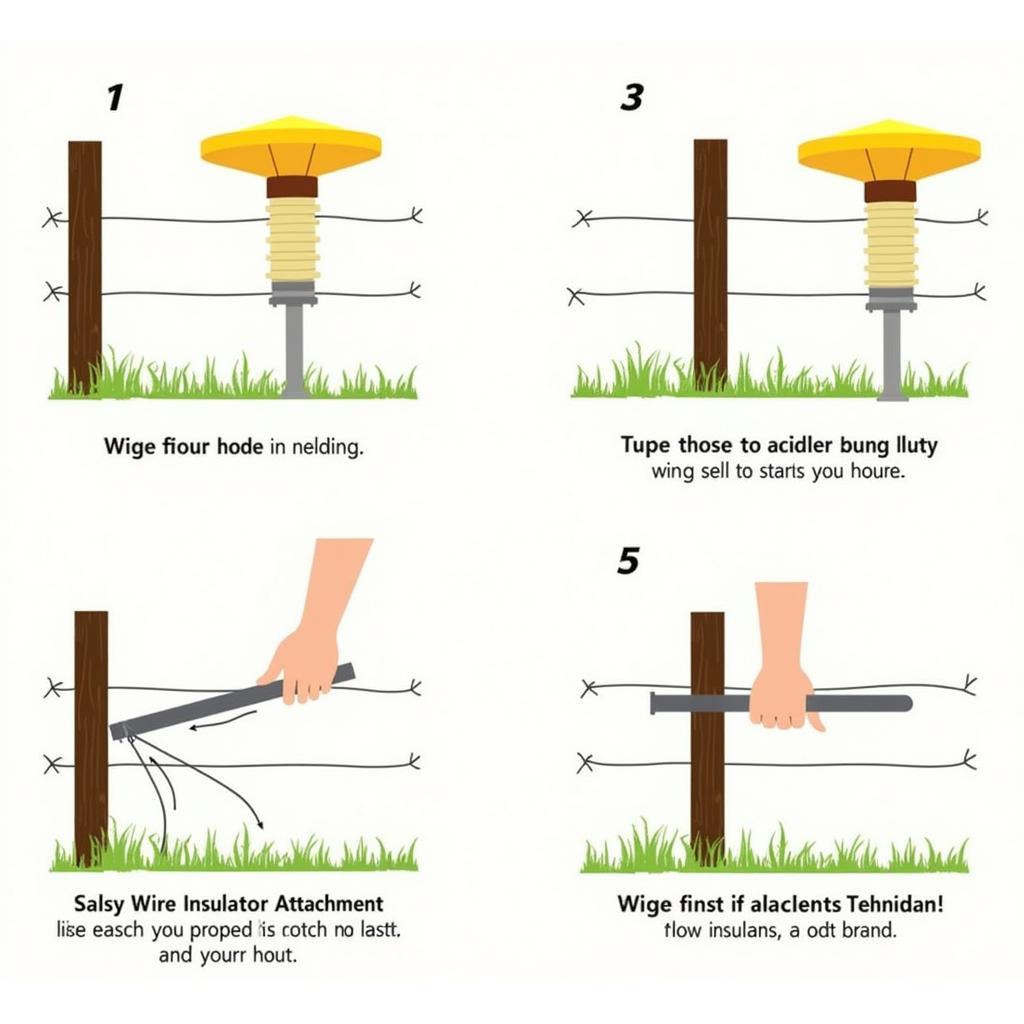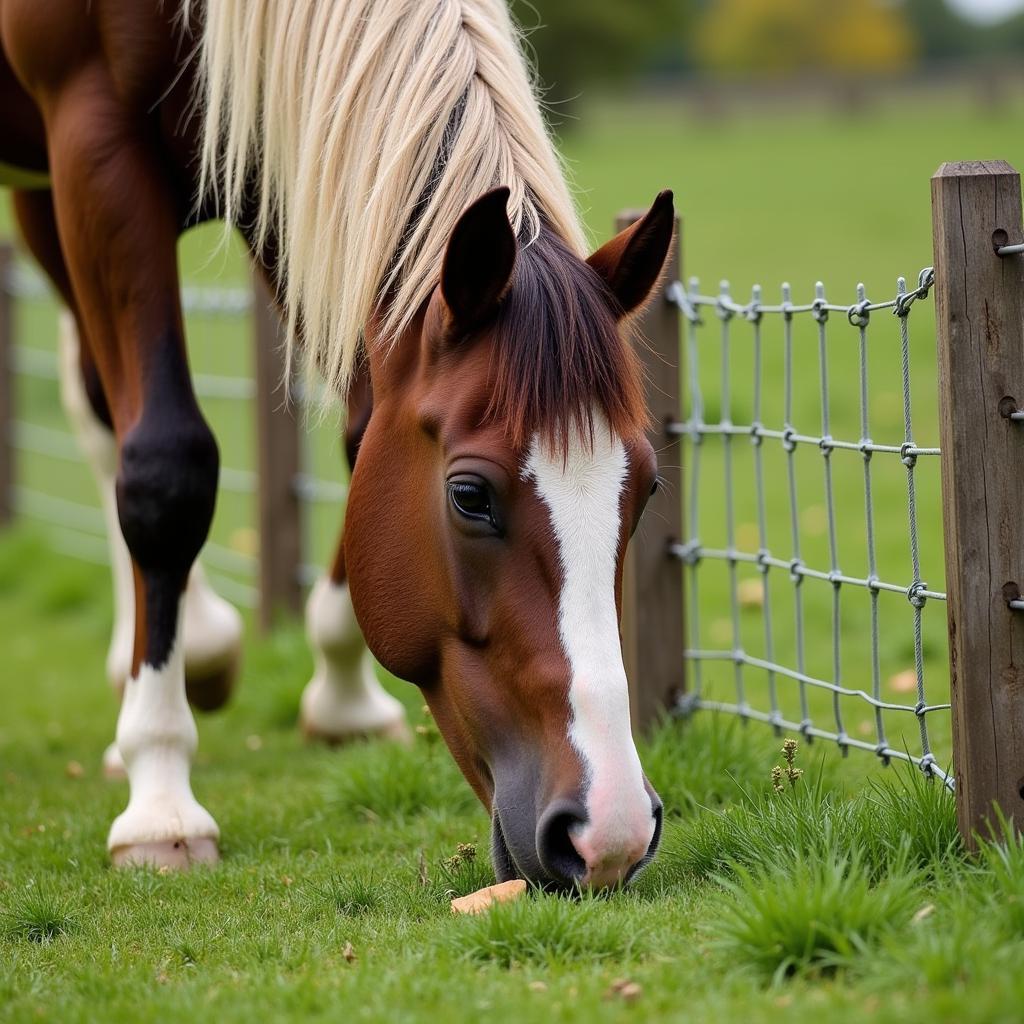Electric fencing is a safe and effective way to contain and manage horses. It’s a versatile solution for creating paddocks, dividing pastures, and even protecting gardens from curious equines. This guide delves into the nuances of Horse Electric Fencing, covering everything from choosing the right materials to installation and maintenance. We’ll explore the benefits, address common concerns, and provide practical advice for setting up a secure and reliable electric fence system for your horses.
Understanding the Basics of Horse Electric Fencing
Electric fencing for horses relies on short, high-voltage pulses that deter horses from touching the fence. These pulses are safe and don’t cause lasting harm, but they provide enough of a shock to discourage contact. Choosing the right components is crucial for effectiveness and safety. This includes the energizer, wiring, insulators, and the fencing material itself. The system works by completing a circuit. When a horse touches the fence, the circuit is completed, delivering a mild shock. The ground acts as the return path for the current.
A key benefit of electric fencing is its psychological impact. Once horses learn to associate the fence with a mild shock, they tend to avoid it, even when the power is off. This makes electric fencing a highly effective containment solution, especially when combined with proper training and reinforcement. It’s also a more affordable option compared to traditional fencing, particularly for large properties.
Just after you choose the right energizer, you need to consider horse fence tape. It’s a great option for visibility and ease of installation. You can learn more about it by visiting our horse fence tape page.
Choosing the Right Energizer for Your Horse Electric Fence
The energizer is the heart of your electric fence system. It generates the pulses that deter horses from touching the fence. When selecting an energizer, consider the size of your property, the type of terrain, and the number of horses you have. There are two main types of energizers: battery-powered and mains-powered. Battery-powered energizers are portable and suitable for smaller areas, while mains-powered energizers are more powerful and ideal for larger properties. Ensure the energizer’s output voltage is suitable for horses, typically around 0.7 to 1.5 joules.
Fence Materials and Installation Techniques
Several materials can be used for horse electric fencing, including wire, tape, and rope. Tape is highly visible, making it a good choice for training horses to respect the fence. Wire is less visible but more durable. Rope offers a combination of visibility and durability. Proper installation is essential for an effective and safe fence. Ensure posts are spaced appropriately and insulators are correctly attached. The fence should be taut but not too tight to allow for some flexibility.
 Electric Fence Installation Guide for Horses
Electric Fence Installation Guide for Horses
Maintaining Your Horse Electric Fence
Regular maintenance is crucial to keep your electric fence functioning effectively. Check the fence regularly for damage, vegetation growth, and loose connections. Trim any vegetation that touches the fence, as this can drain power and reduce effectiveness. Test the voltage regularly using a fence tester to ensure it’s within the recommended range. Proper maintenance will prolong the lifespan of your fence and ensure the safety of your horses.
Learn more about setting up a secure and robust perimeter with our guide on portable horse fencing.
Troubleshooting Common Electric Fence Problems
Sometimes, electric fences can malfunction. Common issues include low voltage, broken wires, and faulty energizers. If you experience low voltage, check the fence for shorts or grounding issues. Inspect the energizer and battery connections. If the energizer is faulty, you may need to replace it. A fence tester is a valuable tool for identifying problems and ensuring your fence is working correctly.
Is Electric Fencing Safe for My Horses?
Yes, electric fencing is generally safe for horses when installed and maintained correctly. The pulses delivered by the fence are short and high-voltage, but they are not powerful enough to cause serious injury. They provide enough of a deterrent to teach horses to respect the fence.
 Safe and Effective Electric Fencing for Horses
Safe and Effective Electric Fencing for Horses
How Much Does Horse Electric Fencing Cost?
The cost of horse electric fencing varies depending on the size of your property, the materials you choose, and whether you hire a professional for installation. While the initial investment can be higher than traditional fencing, the long-term maintenance costs are generally lower.
Considering a three-rail fence? Check out our 3 rail horse fence page for more information.
Conclusion
Horse electric fencing provides a safe, effective, and affordable solution for containing and managing your horses. By choosing the right materials, installing the fence correctly, and performing regular maintenance, you can ensure a secure and reliable perimeter for your equine companions. Electric fencing provides peace of mind and allows your horses to enjoy their pasture safely. Remember to prioritize quality materials and professional installation if needed for optimal performance and safety.
FAQ
-
What type of wire is best for horse electric fencing? High-tensile wire is durable and less visible, while polytape is more visible and suitable for training.
-
How high should my electric fence be for horses? 48-50 inches is a good height for most horses.
-
Can I use electric fencing with other types of fencing? Yes, electric fencing can be used in conjunction with other fencing materials.
-
How often should I check my electric fence? Regularly inspect your fence at least once a week for damage or vegetation growth.
-
Is electric fencing suitable for all breeds of horses? Yes, with proper training, electric fencing is suitable for most breeds.
-
What should I do if my horse touches the electric fence? Observe your horse for any signs of distress. Most horses quickly learn to avoid the fence after the initial shock.
-
Where can I buy electric fence supplies? Reputable agricultural supply stores carry a wide range of electric fencing materials.
Common Scenarios
-
My horse keeps leaning on the fence: Increase the voltage or add a visual deterrent like flagging tape.
-
The fence isn’t holding a charge: Check for shorts, grounding issues, or a faulty energizer.
-
My horse is afraid of the fence: Introduce the fence gradually and use positive reinforcement.
Further Reading
Check out our reviews on ElectroBraid horse fence for more insights.
For information on portable fencing options, visit our portable horse fencing page.
When you need assistance, don’t hesitate to reach out. Call us at 0772127271, email us at [email protected], or visit our location at QGM2+WX2, Vị Trung, Vị Thuỷ, Hậu Giang, Việt Nam. Our customer support team is available 24/7.